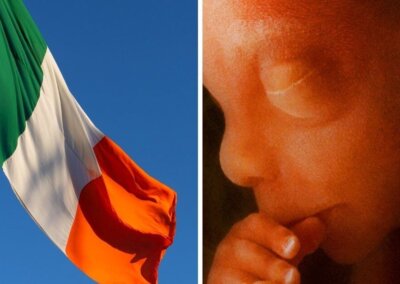Eleven members of the Dáil Éireann, the lower house of the Oireachtas (the Irish Parliament) have supported a Bill that will legally mandate that an unborn child be given pain relief during a late-term abortion.
When introducing the Bill yesterday, Ms Nolan clarified that it addresses the issue of pain in the context of surgical abortion procedures.
“As legislators, we cannot ignore the fact that the existing abortion law does not contain any provision to promote the administration of pain relief, where possible, to an unborn baby prior to the carrying out of a late-term abortion procedure”.
“Ensuring that no baby ever experiences pain or distress that could be avoided is surely something that all people of goodwill can agree on and work to achieve”.
“It’s extraordinary to think that ‘Ireland’s Animal Health and Welfare Act 2013’ obliges vets to give pain relief to an animal during any procedure that may cause it suffering or distress, yet no such provision exists in law for unborn babies during late-term abortions”, Ms Nolan added.
“Medical science has known for some time that unborn babies can experience pain from 20 weeks’ gestation. However, an increasing body of scientific research from about 2007 onwards has suggested that the brain and nervous system develop at a rate which means that unborn babies may feel pain as early as 13 weeks”.
“Injecting mercy into inhumane abortion law”
Peadar Tóibín, leader of the Aontú party that splintered from Sinn Féin in 2019 due to its pro-abortion stance, said of the Bill [it is] “a very reasonable proposal seeking to inject some sort of mercy into an inhumane law”.
Tóibín added it was “incredible” that when TDs introduced amendments to the Health (Regulation of Termination of Pregnancy) Act 2018, including ensuring the unborn would be given pain relief in the case of a late-term abortion, “the Government and much of the opposition opposed these amendments”.
Last year the UK’s All-Party Parliamentary Pro-Life Group (APPPG) commissioned and released a report on fetal sentience and pain summarising the extensive developments in medical science and academic research that point to the same conclusion: it is likely babies in the womb can feel pain, possibly from as early as 12 weeks’ gestation, with some evidence suggesting even earlier.
Right To Life UK spokesperson, Catherine Robinson, said: “This Bill is a step forward for acknowledging the reality that unborn babies are just that, babies, who like all humans can feel pain. It is terrifying to imagine how many unborn children may undergo severe physical pain as part of abortion procedures. Potassium chloride, the drug often used for executions by lethal injection, is often injected into the hearts of fetuses aborted at 22 weeks. Human Rights Watch has highlighted that it is “excruciatingly painful if administered [during an execution] without proper anesthesia” in adults. It is heartbreaking that modern, self-professed progressive societies allow unborn children to potentially suffer such extreme pain. 6,666 legal abortions took place in Ireland in 2019, and every one of these lives lost is a tragedy”.











